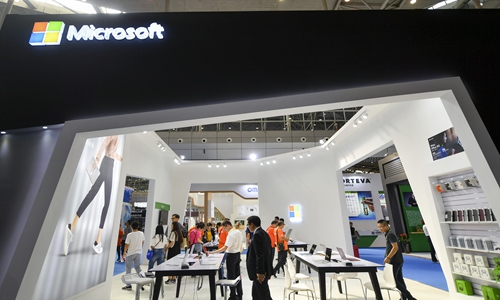Microsoft's plan to close retail stores won't affect performance in Chinese market
Microsoft’s plan to close retail stores won’t affect performance in nation

The Microsoft stand at the China-Eurasia Expo in August 2019 Photo: cnsphotos
Microsoft's decision to stop operating many of its brick-and-mortar retail stores won't affect its business in China, a company spokesperson told the Global Times on Sunday.
The US tech giant announced on Friday a strategic change in its retail operations, including closing Microsoft Store physical locations.
Microsoft's licensed stores and 3C electronics retailers in China will not be affected by the change as its physical retail stores in the Chinese market are all authorized stores and 3C electronics retailers.
Meanwhile, cooperation with Chinese local retailers is expected to bring consumers a comprehensive offline experience of the Microsoft ecosystem, the spokesperson said.
Microsoft said that it will keep its London, New York City, Sydney and Redmond, Washington locations, but they will be re-imagined as "experience centers," according to CNN.
Microsoft has 83 stores worldwide, including 72 in the US, and several others abroad where it showcases and sells laptops and other hardware, according to the company's website.
Liang Zhenpeng, a veteran industry analyst, told the Global Times on Sunday that he sees no impact from Microsoft's move on the Chinese market, even if stores in China are closed in the future.
"Chinese users are more leaning toward online-purchasing and in terms of Microsoft, their competitive products are mostly in software, not hardware like Apple, so physical stores will not be very helpful for sales," Liang said, adding that the company's software is mostly pre-installed in laptops in the market.
Although Microsoft's decision to close physical stores is meant to ease losses due to dropping customer flow in stores amid the COVID-19 outbreak, a major reason is the company's adjustment of its product orientation, Liang said.
"Microsoft's major business is in software development and although it has launched some hardware products such as the Surface laptop, it is far from being successful compared with similar products offered by rival Apple," Liang said.
"Our sales have grown online as our product portfolio has evolved to largely digital offerings, and our talented team has proven success serving customers beyond any physical location," said Microsoft Corporate Vice President David Porter in the company's statement.
Microsoft's retail stores, which debuted in 2009, were seen as a competitor to Apple's offline stores, offering a modern showcase for devices like Windows and Xbox as well as face-to-face customer support.

